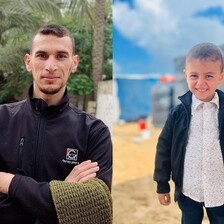The Electronic Intifada 5 December 2023

A once vibrant market is pockmarked by destruction and defined by the absence of any commerce.
In the market, the atmosphere is laden with sorrow, a heaviness that is seen plainly on the pale, displaced faces surrounding me. On either side of the road, the shattered ruins of once bustling homes, shops and businesses bear witness to the unforgiving destruction caused by Israel’s bombardment.
Walking through the heart of Khan Younis, the once lively market now only reflects the somber realities of displacement and desolation. I can even hear my footsteps echo in the haunting silence, a stark contrast to the busy bazaar of yesteryear.
The once rich tapestry of goods, a kaleidoscope of vibrant colored fabrics and abundant produce that previously adorned the shops and stalls that now hang threadbare, casting shadows of scarcity.
Offerings of sustenance are scant, confined to a humble array of tomatoes, cucumbers, eggplants, and the rare glimpse of green peppers.
These vegetables, survivors of Israel’s genocidal violence, stand as testimony to the resilience of their cultivators, reaped before the ravages of war encroached upon their fields.
Trapped within lands now besieged by the Israeli military, winter treasures like cabbage, spinach, peas and arugula are out of reach, left to wither uncollected, echoing the heartache of farmers unable to tend their fields amid the chaos and peril. The void they leave in the market is as palpable as the ache in the hearts of those yearning for the familiar tastes of home that now seem so distant.
Sanctuary struggles
Khan Younis, 54 square kilometers, is the largest city in the southern part of the Gaza Strip and bears the brunt of conflict-induced displacement.
On Sunday, Israel’s military ordered the immediate evacuation of some 20 percent of the city, piling more misery onto the 215,000 Palestinians who fled to the areas when it was designated as a safe area.
Every larger space or building, from wedding halls to universities, and including 35 UNRWA schools, have been repurposed.
Education is a distant dream for many.
The upheaval has revealed a haunting reality – more than 60 percent of Gaza’s homes lie in ruins, grim reminders of lives shattered by ceaseless conflict.
Schools that once resonated with eager students now shelter families seeking safety amid chaos.
Within the confines of these makeshift sanctuaries, survival itself became a herculean challenge. Basic amenities have become luxuries and the electricity flickered sporadically, leaving women toiling in dimly lit corridors, hand-washing clothes in a never-ending battle against darkness.
The communal act of cooking, steeped in tradition, has become an arduous test of resourcefulness. Gas for cooking is scarce, and families cook food over makeshift fires. Even the humble pleasure of fresh bread, a daily staple, now demands improvisation as bakeries have also been targeted.
Amid this stark tableau, the faded ideals etched on the walls of the Mustafa Hafez school – where I had gone to help out relatives who sought sanctuary there – cut deeper. The school motto – equality, justice, independence, freedom – now stands in stark contrast to the harsh realities of the residents’ lives, underscoring the gaping chasm between such lofty aspirations and the grim truth of Gaza today.
Agony of waiting
On my way back from the school, the streets play host to gatherings on every corner. Patience is the new currency for survival. Lines stretch endlessly as people wait for the most basic necessities – gas, fuel, bread, wheat or even the chance to charge a phone.
It is a scene of profound desperation. A fortunate few clutch their refilled gas cylinders on their way back home, treasures salvaged from a desolate landscape, a testament to the scarcity that has engulfed their lives.
I find myself squeezed into a small truck, surrounded by murmurs of the Israeli order to evacuate the eastern parts of our city. Tensions hang palpably in the air, mingling with the dust from battered roads.
As the vehicle rumbles through the streets, hushed voices share fear and speculation. A child’s solemn whisper, however, reverberates in the quiet: “I hope Israel will make us all die so we can find peace.”
Those words, heavy with resignation, pierce the somber atmosphere, encapsulating the desperation lingering within each weary soul. My heart aches, burdened by our collective anguish.
I am resolved to imprint the details of every street, every shadowed corner and each weathered edifice deeper into my memory. I am compelled to etch Khan Younis’ essence inside me, a bittersweet testament to a home on the brink of oblivion.
Bashaer Muammar is a Palestinian activist and translator from Gaza.





